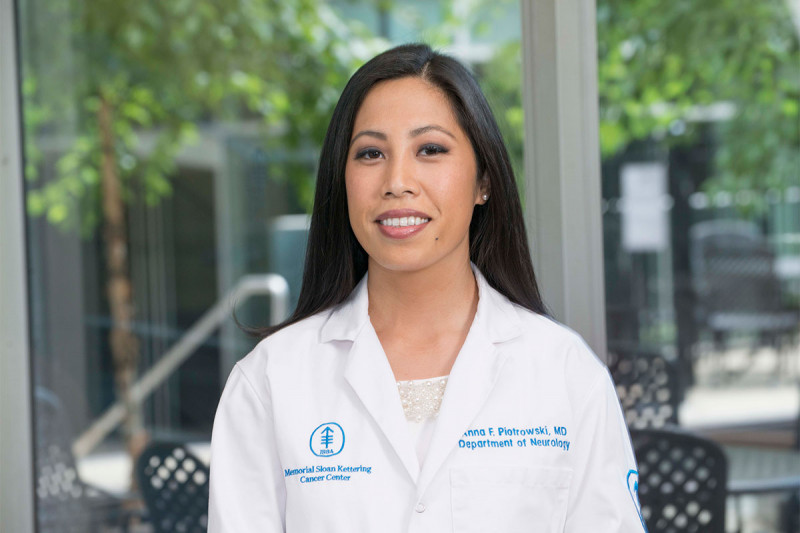
I grew up in New Jersey and always imagined a career in medicine. I wanted to be a pediatrician like my grandmother had been in the Philippines. She would reminisce about carrying her black bag to make house calls, with the children running to greet her.
My parents always emphasized the importance of studying hard. They would take me out for a special lobster dinner when I earned straight As. I kept my interest in medicine up through high school, joining a club at Immaculate Heart Academy that allowed students to shadow doctors at a local hospital to learn about different specialties.
I attended Boston College, majoring in psychology with a concentration in medical sciences. I obtained a master’s degree in physiology at Georgetown, then entered medical school expecting to go into pediatric medicine. When I took a neuroscience class during my second year, I became fascinated by the complexity of the brain. It’s an organ that doesn’t completely understand itself, and there are so many things to learn. Every answer you get brings up more questions.
During my third year in medical school, I had an opportunity to work with experienced neurologists. They were well into their careers, and it was inspiring to see that these doctors seemed very excited about the field and were passionate about their patients. I thought that if neurology was still that interesting to them, it was a worthy pursuit.
The Appeal of Neuro-Oncology
After medical school, I did a neurology residency at SUNY Stony Brook. During my second year, one of my patients was a woman in her 30s who had a fatal brain tumor. It was fascinating yet heartbreaking. It made me realize how much people need empathetic doctors and how much room there is for the field to grow.
I completed a clinical and research fellowship in neuro-oncology at Johns Hopkins and the National Institutes of Health (NIH). I had wonderful mentors during my residency and fellowship, including Agnes Kowalska, Cara Harth, Skip Grossman, and Jaishri Blakeley. Together with Dr. Grossman, I conducted translational work on treatment-related lymphopenia, which is an abnormally low level of white blood cells that can occur as a result of treatments such as chemotherapy and radiation. We wanted to understand how lymphopenia and the immune system affect people with brain cancer. I also continued to learn a lot about how to design clinical trials.
Throughout my training, MSK always held tremendous appeal. I had long admired then-Chair of Neurology, now Physician-in-Chief, Lisa DeAngelis, who is an internationally renowned founder of neuro-oncology. I was so excited when I was offered the chance to join the MSK team in 2016. When I came here, I told Dr. DeAngelis, “I want to do something that nobody’s ever done before.” We decided there was a great opportunity to advance the understanding and treatment of neurofibromatosis.
Neurofibromatosis is an inherited genetic disorder that often leads to tumors in the nervous system. The tumors that result are usually noncancerous, but they can cause disability and become life-threatening. Early this year, MSK launched a multidisciplinary center to improve neurofibromatosis treatment and research. Understanding a disorder that predisposes people to tumors is vitally important to a cancer center like MSK. And I’m fortunate to be at a place that allows me to pursue a focused research interest and specialize in a very rare subtype of an already uncommon disease.
Sharing Information on a Rare Tumor
My research focuses on a type of neurofibromatosis called NF1, specifically NF1-associated gliomas. Although uncommon, these tumors can behave aggressively, and little is known about the best way to treat people who develop them.
An important tool to understand the genetic factors that drive this disease is a database that we just started for people with NF1-associated tumors. We’re collecting all types of information on these patients. This includes genetic analysis with MSK-IMPACTTM to look at the molecular profile of these tumors, as well as clinical information including the treatments they receive, MRIs and other imaging, and details on their response to treatment.
The database is a crucial first step to generating hypotheses about NF1 that we can test with targeted therapies. Other institutions are participating in the database, which is essential — we really need bigger numbers to make a more important statement about this condition.
This underscores an important lesson I’ve taken from the mentors I’ve had throughout my career, including Chief of the Brain Tumor Service and Acting Co-Chair of Neurology, Ingo Mellinghoff: the importance of collaboration and sharing information. It makes everyone stronger to be working together toward the same goal.
Providing Comfort
My greatest joys are my husband and two young sons. Seeing the world through their eyes has been a surprising and exhilarating journey. I also have played the piano since I was a girl. Once, when I was about 12 years old, my grandmother asked me to play when an older relative was ill and the family was gathered around very distressed. I played, and it was soothing for everyone. It made me realize that it was important to do anything I could to contribute to someone’s healing.
This is an essential skill I try to instill in the Cornell medical students, residents, and fellows that I mentor and teach: Listen to what your patients are saying and what their goals are. When they are going through treatment, even if it’s an uphill battle, think about what you can do to make them feel better.




